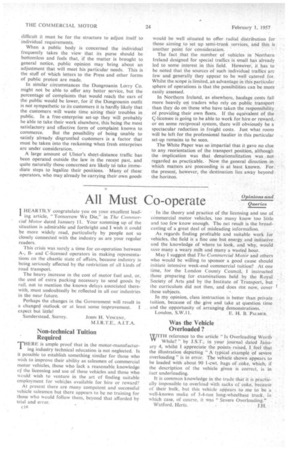All Must Co-operate
Page 54

If you've noticed an error in this article please click here to report it so we can fix it.
I HEARTILY congratulate you on your excellent lead: I jog article, "Tomorrow We Die," in The Commercial Motor dated January 11. Your summing up of the situation is admirable and forthright and I wish it could be more widely read, particularly by people not so closely connected with the industry as are your regular readers.
This crisis was surely a time for co-operation between A-, Band C-licensed operators in making representations on the chaotic state of affairs, because industry is being seriously affected by the restriction of all kinds of road transport.
The heavy increase in the cost of motor fuel and, or, the cost of extra packing necessary to send goods by rail, not to mention the known delays associated therewith, must undoubtedly be reflected in all our industries in the near future.
Perhaps the changes in the Government will result in a changed 'outlook or at least some -improvement. I expect but little!
Sanderstead, Surrey. JOHN H. VINCENI',
• M.I.R.T.E., A.I.T.A.
Non-technical Tuition Required
THERE is ample proof that in the motor-manufactur
ing industry technical education is not neglected. Is it possible to establish something similar for those who wish to improve their ability as salesmen of commercial motor vehicles, those who lack a reasonable knowledge or the licensing and use of these vehicles and those who would wish to venture in the art of finding suitable employment for vehicles available for tire or reward?
At present there are many competent and successful vehicle salesmen but there appears to be no training for those who Would follow them, beyond that afforded by trial and error.
c16 In the theory and practice of the licensing and use of commercial motor vehicles, too many know too little and too few know enough. The net result is the broadcasting of a great deal of misleading information.
As regards finding profitable and suitable work for vehicles, the field is a fine one but energy and initiative and the knowledge of where to look, and why, would save many a weary mitt and many a wasted hour.
May I suggest that The Commercial Motor and others who would be willing to sponsor a good cause should initiate intensive week-end commercial tuition? At one time, for the London County Council, I instructed those preparing for examinations held by the Royal Society of Arts and by the Institute of Transport, but the curriculum did not then, and does not now, cover these subjects.
In my opinion, class instruction is better than private tuition, because of the give and take at question time and the opportunity of arra:nging demonstrations, London, S.W.11. E. H. B. PALMER.
Was the Vehicle Overloaded ?
WITH reference to the article "Is Overloading Worth While?" by in your journal dated January 4, whilst I appreciate the points • raised, I, feel that the illustration depicting "A typical example of severe overloading" is in error. The vehicle shown appears to be loaded with about 90 1-cwt, bags of coke, which, if the description of the vehicle given is correct, is in fact underloading.
It is common knowledge in the trade that it is practically impossible to overload With sacks of coke, because of their bulk, but this vehicle appears to me to be a well-known make of 3-4-ton long-wheelbase truck. in which case, of course, it was "Severe Overloading."
Watford, Herts. J.H.




































































































